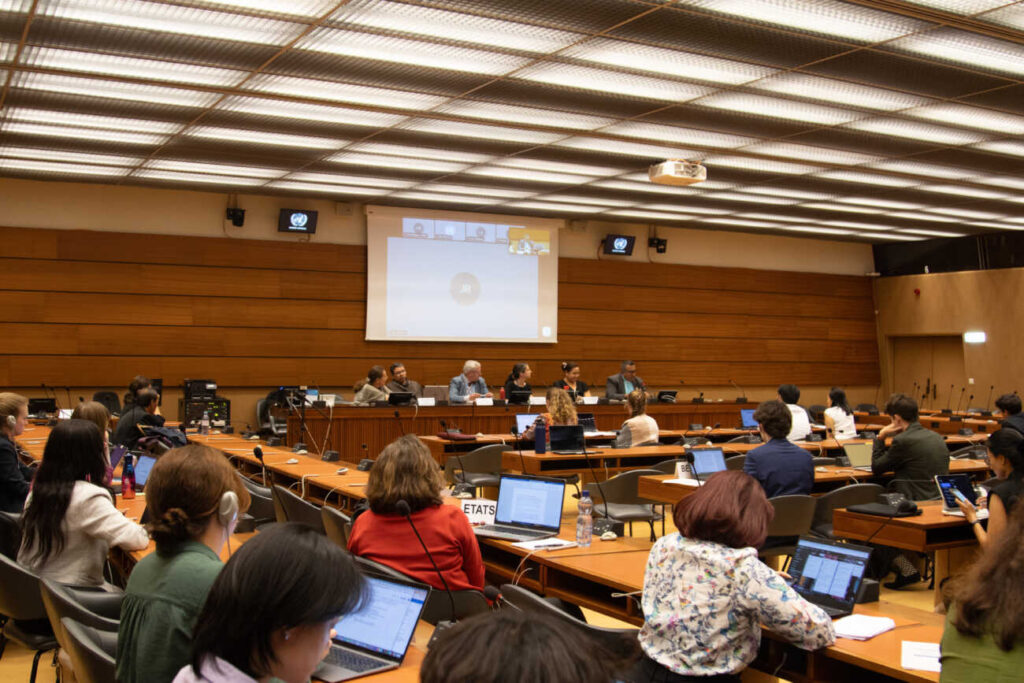
On 28 June, as part of the 53rd session of the Human Rights Council (HRC) in Geneva, a compelling side-event organised by the Geneva Interfaith Forum (GIF) on Climate Change, Environment, and Human Rights took place, drawing an attendance of over 80 people. The event served as a platform for engaging discussions on the pressing issues of climate-induced displacement and its far-reaching impact on human rights.
Between 2020 and 2021, more than 50 million people were displaced due to extreme weather events and faced risks of trafficking and even death as well as discrimination based on race and gender. This finding emerged from the report presented by Mr Ian Fry, UN Special Rapporteur on the promotion and protection of human rights in the context of climate change to the 53rd session of the HRC. The focus of the report centred around “[p]roviding legal options to protect the human rights of persons displaced across international borders due to climate change.”
Fry raised poignant concerns about the grave human rights implications arising from climate-induced displacement and the urgent necessity for effective responses. He highlighted the unsettling reality that climate change poses a significant threat to essential human rights, such as access to food, water, sanitation, housing, health, and education, and, tragically, for some, even the right to life. One particularly troubling statistic that Fry brought to light in his report was that between 2014 and 2022, an astounding number of more than 50,000 individuals lost their lives during migratory journeys.
In response to these dire circumstances, Fry calls for an optional protocol under the UN Convention on the Status of Refugees to address displacement and ensure legal protection for people affected by the climate crisis.
The side-event further amplified the voices of affected communities, with a special focus on small island states, Indigenous Peoples, women, and youth.
Father Rene Arturo Flores Medina OFM from La Red Franciscana para Migrantes highlighted the dire situation in Central America, where the convergence of the COVID-19 pandemic, climate change, and socio-economic inequalities has forced thousands of people to resort to migration. He emphasised the region’s two main climate change manifestations, “dry corridors and hurricanes,” which severely impact food sovereignty.
Ms Iemaima Vaai, representing the Methodist Church in Samoa, emphasised that women and children bear the brunt of the human rights impacts of climate-induced displacement in the Pacific. Extreme weather events and rising sea levels cause displacement, resulting in the loss of indigenous knowledge and affecting traditional livelihoods like fishing, primarily done by women. Despite the challenges, Vaai highlighted that Pacific women and communities draw resilience and healing from their cultural and spiritual beliefs.
Rev. James Bhagwan, General Secretary of the Pacific Conference of Churches, emphasised the need to mitigate the trauma of forced relocation and uphold dignity in the migration process. He noted that climate change impacts are already driving Pacific islanders to seek work in other countries through circular migration. Bhagwan stressed the importance of legal processes.
* The Geneva Interfaith Forum (GIF) on Climate Change, Environment, and Human Rights is composed of ACT Alliance, Brahma Kumaris World Spiritual University, Dominicans for Justice and Peace, Franciscans International, Lutheran World Federation, and the World Council of Churches.
Photo: © Franciscans International

